NEWSLETTER
Table of Contents:
Irene Käosaar: We have been on the right track and been able to change the world
The new Director of the Estonian Language House in Tallinn is Hedvig Evert
1472 people signed up in May for the free online courses of Estonian
Registration for Estonian language and culture clubs is open again
Language cafés have opened their doors again
This year, there will be eight family learning sessions for young people
The Integration Foundation is looking forward to applications for integration awards
Rap opera “KARMA” - a unique language learning project
Open calls for tenders and calls for proposals
Irene Käosaar: We have been on the right track and been able to change the world
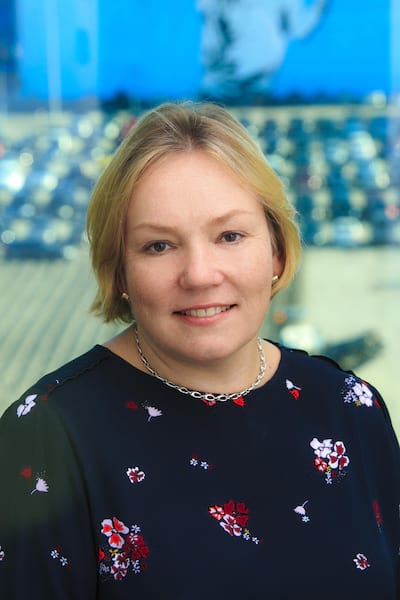
In April, the Council of the Integration Foundation decided to extend the contract of Irene Käosaar, Director of the foundation, for the next period. Irene Käosaar has been leading the Integration Foundation since 1 September 2017. We asked Irene Käosaar to take a look at what has been done over the past three years and to introduce future plans.
To speak out frankly, I have to start from the beginning…, i.e September 2017, when I started working as the Director of the Integration Foundation. At that time, we were located at Ülemiste City and we had three counsellors in Narva, there were 21 of us in total. Times were confusing for the foundation - the Council had decided to move the institution to Narva, but no actual steps had been taken yet. The idea of creating Estonian Language Houses was in the air, but no one knew if they would actually come true, and if they would come true, would they be part of the Integration Foundation or not. The team was a little bit anxious and unaware, partners were waiting.
I first started working for the foundation in 2000, when the former head of the foundation, Mati Luik, a man with a wide view and clear vision, took over the language immersion program. The foundation had been established a few years before that, in 1998. During those seven years of work, the foundation rose from the ashes, becoming the flagship of the then integration policy still in its infancy. This is where the free Estonian language courses for adults started, the development of updated methodologies and materials for teaching Estonian in schools with Russian as the language of instruction, working with national cultural societies and supporting their dignity, leading various integration projects and bringing international experience to Estonia, as well as immersion methodology development. Later working for the Ministry of Education and Research, for 10 years, I was the contact person for one of INSA's largest financiers at the time, a member of the Council and a member of the integration policy-making steering groups. Therefore, the foundation had played an important role in my life for over 20 years.
Going back to 2017, when I was running for the head of this institution, I saw in my mind a resurgence of the foundation. My goal was for this body to once again become an opinion leader, a ringleader, a partner for policy makers, and a caring and professional supporter for integration players. My goal was to have people with shining eyes in this institution, motivated to contribute to the field, and caring colleagues in their daily work.
The Foundation's staff and partners, first and foremost, can say whether I have achieved my goals, but I believe that the Council's trust was a recognition to all of us, to the whole staff of the Integration Foundation, that we have been on the right track. Paraphrasing Hando Runnel, we have been able to change the world - not much, but just as much as we could … Thank you for your recognition and trust!
So, what has changed in those three years? The head office of the Integration Foundation is now located in a beautiful new environment in Narva, in the renovated Linda 2 building. In Tallinn, we have moved to Rävala Puiestee - we asked our students and partners where the Estonian Language House of Tallinn should be located, and based on this feedback we chose a new home for us in Tallinn. Two Estonian Language Houses have been opened, in Narva and Tallinn, with branches in Sillamäe, Kohtla-Järve, Tartu and Pärnu. The foundation employs almost 40 people, and for me, a basis for the assessment on how the team is doing and in what condition it is, was coping with the emergency situation, because coping with a crisis often shows the real picture. Speed and professionalism, how the activities were replayed according to the situation, caring and unitedness, how everyone supported each other - it moves me to tears and I take off my hat to all my colleagues.
How to proceed - for three years there has been continuous construction, either substantive or technical, with sleeves constantly rolled up. The goal for the coming years is to take our activities even further, to involve more people, to bring them together, to support our players - to provide language studies and cultural education, to bring people with a mother tongue other than Estonian into Estonian cultural space, to give Estonian-speaking people the opportunity to notice and appreciate the cultural diversity and its wealth around us every day. At the end of April, the Council approved our new strategy for 2020-2025, one of the keywords of which is quality. We wish to be even more clearly present in the society and help with those activities where the impact on increasing the cohesion of society is greatest.
The new Director of the Estonian Language House in Tallinn is Hedvig Evert

At the beginning of May, as a result of a close competition, Hedvig Evert started working as the Director of the Integration Foundation's Estonian Language House in Tallinn.
"I am very pleased that Hedvig Evert is joining our busy team. Hedvig's previous work experience and background provide a good basis for the successful management and development of the operation of the Estonian Language House. We learnt during the emergency situation that one of the biggest expectations on us by the society is to be flexible and to proceed from the real needs of learners in different situations. I believe that Hedvig is just the person who will help us keep this goal in mind and be even better," said Irene Käosaar, Director of the Integration Foundation.
Before joining the team of the Integration Foundation, Hedvig Evert worked as the Head of Teacher Training at the Tallinn Teachers' House. Before that, she conducted management and teacher training as an entrepreneur, worked as a private and school French teacher, upper secondary school homeroom teacher, and Head of the Humanities Department at Tallinn English College.
Hedvig Evert holds a Master's degree in French Philology and Organizational Behaviour from Tallinn University, specializing in leading creative teams. In addition, she holds a Master's degree in French Pedagogy from the University of Rouen in France. Hedvig Evert has completed a number of in-service trainings in business, creativity, and language learning.
"Having lived in Paris and Brussels for some time, I know what it means to adapt to and orientate oneself in a different linguistic and cultural space. For a long time now, the borders of today's Estonia are no longer measurable only by land, but many people from other countries and cultures live and work in our cultural space on a daily basis, both physically and as e-residents. As the Director of the Estonian Language House in Tallinn, I would like to make my contribution, so that thanks to the diverse language learning opportunities of our house, people would feel at home in our society and describe our country in words - open, friendly, and kind,” said Hedvig Evert, the Director of the Estonian Language House in Tallinn.
The Integration Foundation has been conducting adult language learning since 1998 with the help of its Estonian language teachers and partners. Since 2018, Estonian Language Houses in Tallinn and Narva have been operating under the authority of the foundation in order to provide broad opportunities for learning and using the Estonian language, and offer the language environment necessary for students. Language learning and counselling services provided by Estonian Language Houses are free of charge for everyone.
An initiative by the Integration Foundation united 885 Estonian language enthusiasts around the world
 The Volunteer Language Friends project that was initiated by the Integration Foundation and lasted from 20 March to 19 May united 885 people around the world for the purpose of learning and practising Estonian. As part of the project, 410 volunteer mentors helped 475 Estonian language learners to practise the spoken language, talking to them a few times a week via e-channels in Estonian on various vital topics.
The Volunteer Language Friends project that was initiated by the Integration Foundation and lasted from 20 March to 19 May united 885 people around the world for the purpose of learning and practising Estonian. As part of the project, 410 volunteer mentors helped 475 Estonian language learners to practise the spoken language, talking to them a few times a week via e-channels in Estonian on various vital topics.
“Due to the emergency situation, the events that had taken place regularly so far in our Estonian Language Houses for practising the language of communication were cancelled, so we decided to involve volunteer Estonian language mentors in order to offer language learners an opportunity to communicate with them in Estonian through e-channels. Many people responded to the call made through social media, helping during the last two months those who wanted to learn Estonian to practise the language of communication and overcome the language barrier," said Irene Käosaar, Director of the Integration Foundation.
The task of the mentors was to communicate with language learners in Estonian a few times a week on various vital topics through online channels. Some mentors helped several language learners to practise the language. The teachers of the Estonian Language Houses of the Integration Foundation and the Estonian language methodologists involved in the project instructed the mentors by offering them short trainings and recommending study materials. The mentors actively exchanged information and their experiences in assisting language learners.
“The most important result of the project for us is that various people in Estonia and elsewhere in the world have got to know each other better, found a common language, discovered much in common despite the differences, and together contributed to the spread and use of the Estonian language. Based on the feedback given by language learners, as a result of two months of lively communication, they have gained a lot of inspiration and courage to speak more in Estonian and learn it further. According to the mentors, participation in the project has broadened their horizons and helped them to get acquainted with the different cultures of people living in Estonia. We are very grateful to all the volunteers and we will definitely continue to cooperate in the future," Irene Käosaar added.
Most of the mentors were from Estonia, but in addition to them, Estonians from 20 countries around the world joined the project: from Sweden, Belgium, the Netherlands, Romania, France, Italy, Spain, Portugal, Switzerland, Luxembourg, the Czech Republic, Hungary, Russia, England, Ireland, Indonesia, the United States, Canada, Colombia, Uganda. The language learners were mostly Estonian residents, however, some people interested in the Estonian language were located in Finland and Russia.
All mentors contributed to the project voluntarily; language learners joined the initiative through public registration.
Volunteers who are ready to continue cooperating with the Integration Foundation will be involved in various projects related to language learning and integration in future.
1472 people signed up in May for the free online courses of Estonian

In May, registration for the Integration Foundation's free Estonian language online courses took place for the first time. A total of 1472 adults signed up for 92 courses at A1, A2, B1, B2, and C1 levels. The next opportunity to register for the courses will open in August with the Integration Foundation offering another more than 2,500 study places.
The first online course started on 7 May and the last one will start on 3 July. Most courses will end by autumn. Participation in online courses requires students to be able to use the Internet and to have a computer or a smart device. Each trainer has selected a suitable online environment for studying, and instructs the course registrants on how to use it.
In addition to online registration, it is possible to access the free Estonian language courses through counselling. As a result of the counselling, person’s wishes and opportunities will be recorded, and later they will be invited to study at the Integration Foundation's Estonian Language Houses or at a suitable course provider. People who have undergone counselling do not have to sign up separately to take Estonian language courses.
To register for counselling, contact the counsellors of the Integration Foundation’s Estonian Language Houses by e-mail info@integratsiooniinfo.ee or by the toll-free telephone line 800 9999.
Free of charge learning of Estonian for adults is financed by the Ministry of Culture.
Registration for Estonian language and culture clubs is open again
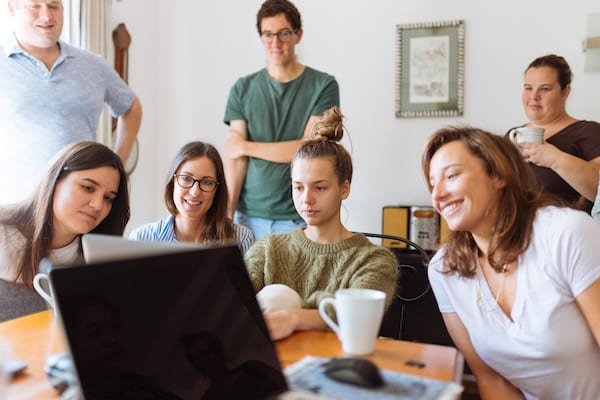
This year the Integration Foundation will be running 24 language and culture clubs all over Estonia in order to provide people living in the country whose mother tongue is a language other than Estonian with opportunities to practise the national language and learn more about local culture. The clubs are designed primarily for those who already speak Estonian at the Intermediate or a more advanced level but who need more practice and encouragement in order to communicate in the language more freely.
The clubs are open to anyone aged 18 and over who has passed the state exam in Estonian at the B2 or C1 level or at the Intermediate or Advanced level (see §39 of the Language Act) and has a certificate to prove it, to those who have previously taken part in the Estonian courses offered by the Integration Foundation at the B2 and C1 levels.
“The clubs are ideal for those who want to practise their Estonian so as to better speak it at the B2 or C1 levels or prepare for the spoken part of the B2 or C1 exams,” explained Jana Tondi, the Head of Language Studies at the Integration Foundation. “Anyone who’s previously been a club member can come along as a guest, too. They need to register as well and then work out the details with the organisers. Each club meeting is open to up to two guests.”
The list of the clubs that are set to open is being constantly updated, with registration ongoing on the Integration Foundation website at www.integratsioon.ee/eesti-keele-klubid.
Irina, a member of the club run by the NPO Atlasnet, says that attending the meetings gave her the confidence she needed to start using Estonian on an everyday basis. “I liked the fact that every meeting was different,” she said. “We talked about something new every time, and the people running it made sure we used Estonian throughout. I particularly enjoyed the excursions we went on, as well as the songs we sang and the Estonian films we watched and discussed. I’d been really reticent to use Estonian before I joined the club, but I’m more than willing to now, and I’m happy to speak to clients at work in Estonian. I started watching the news and [the current affairs programme] Pealtnägija on ETV as well. I know a lot more about Estonian culture now than I used to, and all the things I learn I tell my friends and family about. For my next holiday I’m planning a road-trip around the country.”
In Tallinn and Narva the clubs are organised by Atlasnet, while in Kohtla-Järve, Sillamäe and Jõhvi the organiser is Mitteldorf OÜ and in other large towns and cities (including Tartu, Pärnu, Valga, Haapsalu and Paide) they are being run by Change Partners OÜ.
Estonian language and culture club activities are supported by the Integration Foundation from the resources of the ‘Activities supporting integration in Estonian society’ project of the European Social Fund.
Integration Foundation is looking forward to participants for trainings on getting to know the Constitution and the Citizenship Act
All poorly integrated permanent residents and new immigrants at least 18 years of age with a mother tongue other than Estonian and a culture other than Estonian are welcome to receive training on getting to know the Constitution of the Republic of Estonia and the Citizenship Act. The duration of the training is 18 academic hours.
The trainings are planned for this year as follows: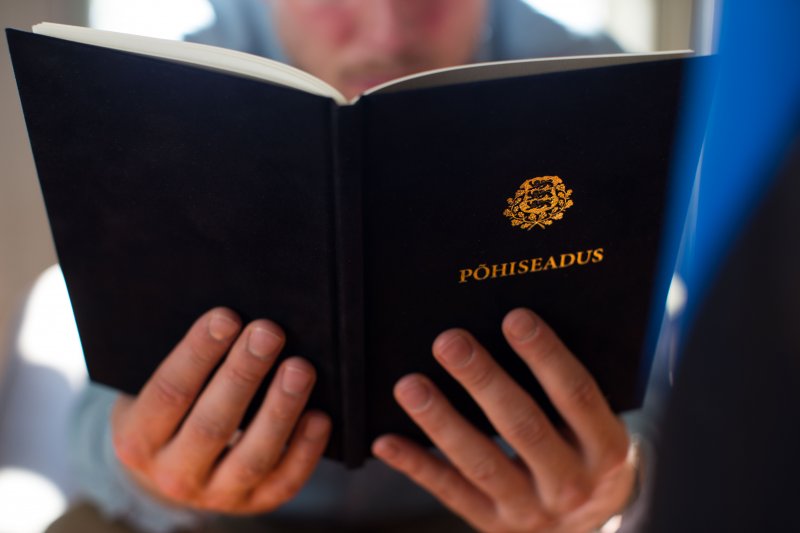
- 29-30 August 2020 in Tallinn
- 12-13 September 2020 in Tallinn
- 17-18 October 2020 in Tallinn
- 17-18 October 2020 in Jõhvi
- 7-8 November 2020 in Tallinn
- 7-8 November 2020 in Tartu
- 5-6 December 2020 in Tallinn
- 5-6 December 2020 in Jõhvi
The organizer of the training is Paurman & Partners Õigusbüroo OÜ. To sign up for the training, please visit the website www.kodanik.net.
The training is funded by the European Social Fund project "Conditions for Providing Grants to Activities Supporting Integration in Estonian Society".
Language cafés have opened their doors again
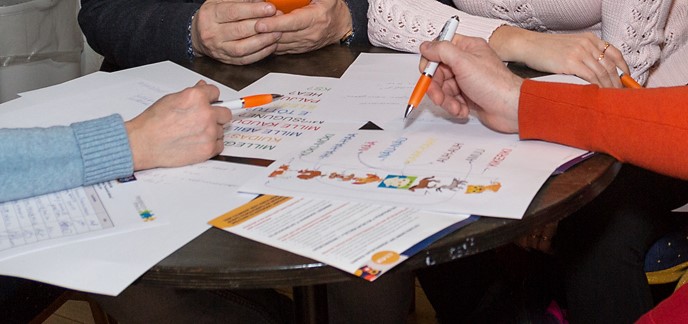
Language cafés, which started in March, were shut down during the emergency situation, but now they are gradually reopening their doors to language learners. Throughout the summer, those who wish can go to language cafés to practise the language, and new meeting times are also planned for autumn.
“The cafés are perfect for those looking to build up their courage and self-assurance in using Estonian,” said Kätlin Kõverik, a senior advisor with the Integration Foundation. “We don’t do any writing; we don’t do any exercises; we don’t do any reading. We talk. It’s all about speaking! They’re a chance to take a break from your everyday routine and practise your Estonian in a relaxed atmosphere outside of the confines of a traditional classroom setting. They’re of great support in studying the language as well.”
You can get acquainted with the schedule of the language cafés and fill in the participant's form on the website of the Integration Foundation https://integratsioon.ee/eesti-keele-kohvikud. The schedule is updated on an ongoing basis.
Situations and topics which arise in day-to-day life are discussed at the cafés, which focus on speaking and on understanding what is said. The topics covered include things like introducing yourself, looking for work, training and studying, communicating with colleagues, travelling, enjoying hobbies and marking special days and occasions, as well as everyday situations such as attending doctor’s appointments and dealing with officials. Language cafés are ideally suited to those who find it difficult or impossible to attend regular classes each week but who still want to improve their Estonian skills, since the format complements independent studies of the language.
The cafés are taking place year-round all over the country: in Tallinn, Keila, Maardu, Paldiski, Jõhvi, Kiviõli, Kohtla-Järve, Narva, Narva-Jõesuu, Püssi, Sillamäe, Tapa, Haapsalu, Pärnu, Tartu and Valga.
Taking part in the cafés is free of charge.
Activities are supported by the Integration Foundation from the resources of the ‘Activities supporting integration in Estonian society’ project of the European Social Fund.
This year, there will be eight family learning sessions for young people
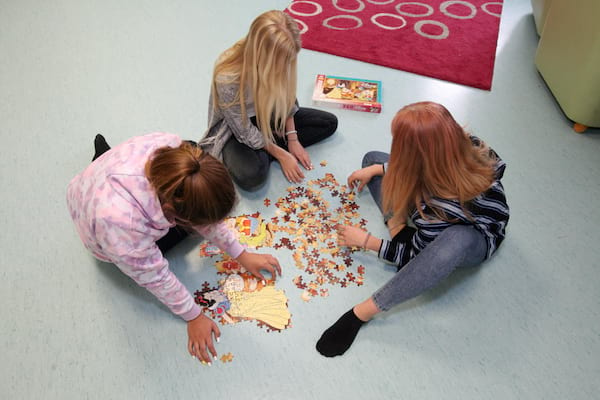
This year, the Integration Foundation offers family learning to 106 young people who are aged between 7 and 19, live in Estonia, and have a mother tongue other than Estonian. Living in an Estonian-speaking family for ten days, young people will be able to take a closer look at Estonian culture, visit exciting places, practise the Estonian language, and establish contacts with young people of the same age who speak Estonian as their mother tongue.
Family learning sessions in the summer of 2020 will take place as follows:
- I Session 8-17 June
- II Session 19-28 June
- III Session 1-10 July
- IV Session 13-22 July
- V Session 25 July - 3 August
- VI Session 6-15 August
- VII Session 6-15 September
- VIII Session 18-27 September
More information about family learning is available on the website of the Integration Foundation https://integratsioon.ee/pereope.
Additional information and registration:
Pille Kulberg
Project Manager at MTÜ VEEDA VAHEAEG VÕRUMAAL
Telephone: +372 527 5354
e-mail: pille.kulberg@mail.ee
Last year, 86 young people from various schools all over Estonia participated in the learning of Estonian language and culture in families, supported by the Integration Foundation. Learning took place in Võrumaa and Tartu.
Integration Foundation announced a call for proposals to support sports and cultural events promoting business in Ida-Virumaa
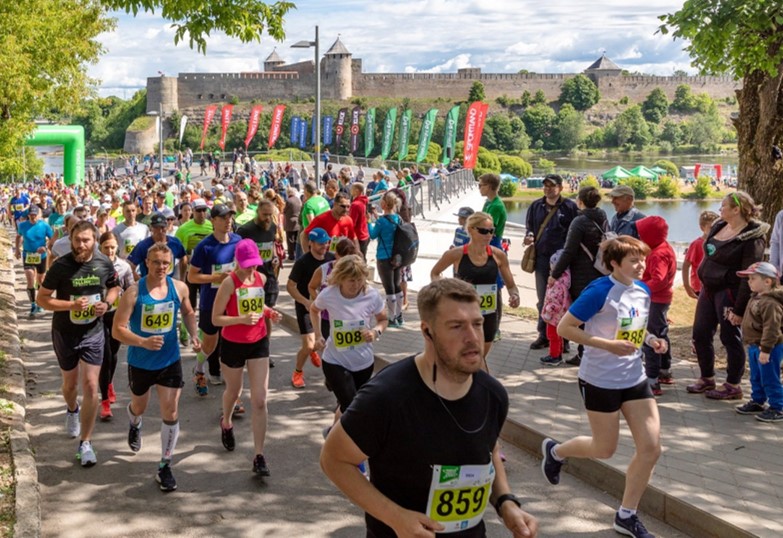
Today, on 27 May, the Integration Foundation announced a call for proposals to support sports and cultural events taking place in Ida-Virumaa, which promote the region's economic development, business and tourism, increase the region's attractiveness, bring visitors from all over Estonia, and help create contacts between people with different cultural backgrounds. Applications can be submitted until 29 June 2020. The call for proposals is funded by the Ministry of Finance.
"This is one of the several measures with which we wish to revive the economy of Ida-Virumaa, including domestic tourism in Estonia," said Jaak Aab, Minister of Public Administration. “By providing grants for organizing sports and cultural activities in Ida-Virumaa, we support small enterprises in the county at the same time. In addition to individual events, organizers of series of events and long-term festivals are very welcome to apply for the grant.”
"By supporting sports and cultural events held in Ida-Virumaa, we can strengthen the ties of other Estonian regions with Ida-Virumaa, and contribute to increasing the daily contacts and communication between people with different cultural backgrounds and thus to the wider use of the Estonian language in the region," said Jana Tondi, Head of Language Learning at the Integration Foundation.
The budget for the call for proposals is EUR 253,000. The minimum grant amount is EUR 10,000 and the maximum is EUR 25,000 per application. The events supported in the call for proposals must be of at least county-level importance and have a minimum number of participants of 1,000 people. Both first-time sports and cultural events as well as recurring ones will be supported.
The grant can be applied for through the Ministry of Culture's grant processing information system.
As a result of last year’s competition “Sports and Cultural Events Promoting Business in Ida-Virumaa”, 14 events taking place in Ida-Virumaa were supported in the total amount of 252,900 euros. These included events such as the Ballet Festival in Jõhvi, music festival "Mägede hääl" at the Estonian Mining Museum in Kohtla-Nõmme, Narva Opera Days and show "Kremli Ööbikud" at Kreenholm Manufactory in Narva, Station Narva 2019 festival, series of running events in Narva and Narva-Jõesuu, a motocross weekend at Kiviõli Adventure Centre, the first organization of the Estonian Football Association's season opener "Super Cup" at Narva Kalev-Fama Stadium, and others.
The promotion of Ida-Virumaa’s business and tourism, and the initiation and development of sports and cultural events in Ida-Virumaa are part of the Ida-Virumaa program carried out within the framework of the national regional development strategy, which is implemented by the Integration Foundation in cooperation with the Ministry of Finance.
Additional information on participation in the call for proposals can be received during the Information Days taking place on 11 June (in Estonian) and 12 June (in Russian) in the Zoom environment. You can sign up for the Information Days at veronika.stepanova@integratsioon.ee. More detailed information on participating in the event will be sent to the registrants.
The Integration Foundation is looking forward to applications for integration awards
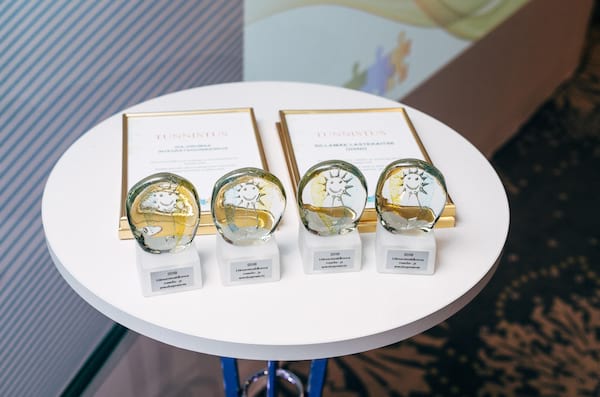
Applications are welcome to the Integration Foundation for receiving awards for projects carried out in the field of integration. Applications can be submitted by both legal entities registered in Estonia and natural persons living here, who in the period from October 2019 to September 2020 have contributed to the introduction of various cultures and implemented projects supporting cooperation between people with different mother tongues. The deadline for applications is 23 September 2020.
"By awarding prizes in the field of integration, we wish to recognize the players around us who build bridges between representatives of different communities and cultures, who help them find a common language and give a boost to their cooperation," said Kristina Pirgop, Head of National Minorities at the Integration Foundation. "To the competition, we look forward to projects that started at the end of last year, as well as those that started or are just about to start this year and will end in September," Kristina Pirgop added.
The integration prize fund is EUR 4,000. The prizes will be awarded in four categories and the best project promoter of each category will receive a prize of EUR 1,000.
Applications for awards can be submitted in the following categories:
- Cultural Introducer of the Year (introduction of the cultures of national minorities living in Estonia to the Estonian public);
- Bridge Builder of the Year (implementation of cooperation projects between native Estonians and non-Estonian residents);
- Message Carrier of the Year (development of attitudes supporting integration through the media);
- Spark Organization of the Year (implementation of outstanding activities in the field of integration).
Projects with the implementation period between 01.10.2019 - 22.09.2020 can be submitted to the competition.
Applications can be submitted in several categories, but in this case, different projects or activities must be proposed in each category. The competition is not open to legal or natural persons who have already received an integration award in the last three years.
To participate in the competition, you must fill in the application form available on the Integration Foundation’s website. The Competition Guide can be found on the same page. The completed application must be sent to the Integration Foundation’s address taotlus@integratsioon.ee with the comment “Nomination - Integration Awards 2019-2020" by 23 September 2020.
The names of the prize-winners will be published on the website of the Integration Foundation and the awards will be presented at the end of 2020.
The Integration Foundation has been awarding prizes for integration development projects since 1999 and for media projects since 2009. The fund of the Integration Award Competition 2019-2020 is financed by the Ministry of Culture.
Rap opera “KARMA” - a unique language learning project

This spring, the Estonian Language House of the Integration Foundation in Narva started a unique Estonian language learning project - production of the rap opera "KARMA". Estonian language learners from Ida-Virumaa are involved as actors in the rap opera. The premiere of the rap opera is planned for autumn 2020 within the framework of Narva Opera Days.
“Until now, in addition to the usual classes in Estonian Language Houses, we have taught Estonian by cooking together, making crafts, watching films, singing, and playing board games. This is where the idea of a new creative language learning project came from - here you can learn the language by acting and rapping" said Krismar Rosin, teacher at the Estonian Language House in Narva, and author of the idea of the rap opera. "The rap opera "KARMA" tells a moving, lively and energetic story about Karma, a single mother living in Narva, who overcomes all prejudices and obstacles in the name of a cloudless future for her children, and achieves success in both working and private life," Krismar Rosin added.
The production of the rap opera has started vigorously, and the first act will soon be completed. Auditions for roles in the rap opera continue, in the course of which the candidates perform various tasks related to the Estonian language and rapping as well as undergo training related to performing arts. The final composition of the actors will be set in July, followed by a two-day seminar where the producer and music director assign roles to the participants. The premiere of the rap opera is planned for autumn and will take place within the framework of Narva Opera Days.
The top of Ida-Virumaa’s street, hip-hop and break dancers take part in the performance.
The creative team of the rap opera includes well-known players from several fields and generations: renowned opera director and current tutor of the performing arts module of Kohtla-Järve High School - Neeme Kuningas, musicians Pavel Botšarov and Karl Kivastik, VAT Theatre’s playwright Mihkel Seeder, orchestra conductor and arranger Teno Kongi, leader of Narva Opera Days - Julia Savitskaja, teacher at the Estonian Language House of the Integration Foundation in Narva - Krismar Rosin, etc.
Open calls for tenders and calls for proposals
Information on the announced calls is published on the Integration Foundation's website at integratsioon.ee/konkursid.
Our calendar
Information on events that take place by our organisation, participation or support, can be found in the calendar published on our website.
Our news
You can read the latest announcements of the Integration Foundation in the news section of our website and on the Facebook page of the Integration Foundation or the Estonian Language Houses.
